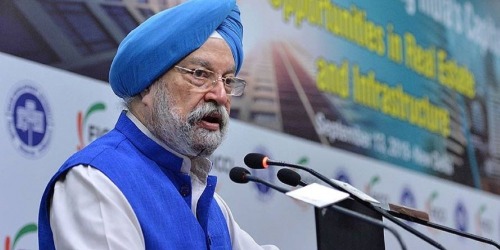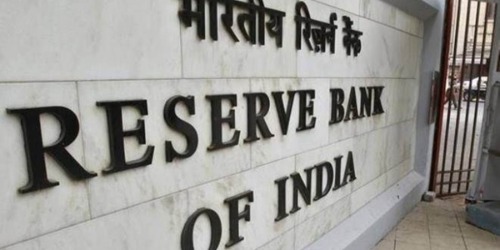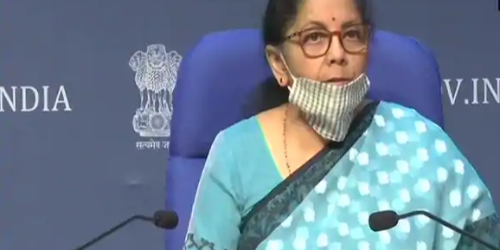International Flights May Start "Even By Middle June": Aviation Minister

International flight operations may start by mid-June or end-July if the COVID-19 virus "behaves in a predictable manner", Civil Aviation Minister Hardeep Singh Puri said Saturday afternoon, during an online discussion with the public to clarify norms governing "calibrated" restart of domestic flights from Monday.
Mr Puri said the government was working towards restarting a "good percentage" of passenger flights that have been grounded since the start of the lockdown to break the coronavirus chain of transmission.
"Why wait till August or September? If situation eases or improves, if virus behaves in predictable manner and we get used to co-exist(ing) with it, we're in position to make arrangements. Why not start by June middle or end July?" Mr Puri said today.
During his interaction the minister also said he did not understand the need to quarantine domestic fliers who show "green" status on the Aarogya Setu app. He made a similar point during a press briefing on Thursday, during which he revealed details of revised flight ops, including air fares.
Mr Puri's comment was followed by as many as six states, including Kerala, Karnataka and Assam, insisting that people arriving via domestic flights will be quarantined.
This morning Karnataka said incoming passengers from six states with the most infections will have to undergo seven-day institutional quarantine and seven days of home isolation. Exemptions will be made for the elderly, the terminally-ill, children and pregnant women.
On Friday, Tamil Nadu urged the centre to rethink the reopening of air travel, citing a surge in coronavirus cases in state capital Chennai and non-functioning public transport, which will trouble passengers commuting between the airport and the city - a distance of around 10 kilometres.
Chennai airport has been closed for passenger traffic, as have all others in the country, since the COVID-19 lockdown began (File)
The debate over quarantine being mandatory for air passengers was kicked off by Mr Puri on Thursday, when said an unnecessary "fuss" was being made over quarantine of domestic air travellers.
He pointed out that as per revised SOPs governing air travel during the lockdown, those showing "red" on the Aarogya Setu app, which he promoted as an "excellent contact-tracing device", would not even be allowed to enter the airport, let alone board a plane.
"I don't know why we are making such a fuss on the quarantine issue. Bhai, this is domestic travel. Same laws will apply here that applies when you travel by train or a bus... People who are positive will not be allowed to board the flights," he said.
Passenger flight operations were stopped in March after a nationwide lockdown was ordered to halt the spread of the COVID-19 virus; cargo flights, those for medical evacuation and special flights to repatriate Indians stranded abroad were allowed to operate.
On Wednesday Mr Puri said domestic passenger flights would be re-started in a "calibrated" manner.
The resumption comes as the country experiences a worrying surge in fresh COVID-19 cases - nearly 25,000 have been recorded over the past four days, with 6,654 reported over the past 24 hours, according to government data this morning.
The total number of cases in India has crossed 1.25 lakh, with 3,720 deaths reported.
The Railways has already moved to gradually restart services; it has been running trains for migrants since May 1, as well as 15 special passenger trains starting from New Delhi.
Starting June 1, 200 regular passenger trains will also begin operating. Passengers will also have to show "green" on the Aarogya Setu app before travelling, and will have to spend 14 days in isolation on arrival.
- 0
- Leave a comment
RBI rate cut: For home loan of Rs 50 lakh, EMI to reduce by this much

With the Reserve Bank of India (RBI) cutting the repo rate to 4 per cent from the existing 4.4 per cent, the borrowers expect relief from the rate sensitive realty and auto sectors. The RBI lowered the repo rate by 40 basis points Friday after reducing it by 25 basis points mid-April and 75 basis points on March 27. The customers now expect the banks to pass on the benefits on their car loans, personal loans and home loans. If the banks pass on the benefit and slash the marginal cost of funds based lending rates (MCLR), it may have a direct impact on the amount of equated monthly installment (EMI) customers pay for their loans. MCLR is the minimum interest rate that a bank charges on the loan.
Here's all you need to know about impact of the rate cut on home loan EMI:
Assume a male (salaried) borrower has taken an SBI home loan of Rs 50 lakh for a twenty year-tenure, which currently carries an interest rate of 7.65 per cent. That means the EMI at present is Rs 40,739. But if your bank lowers its interest rate by 40 bps to pass on the complete benefit of the repo rate cut, at 7.25 per cent interest rate, your EMI will come down by Rs 1,220 to Rs 39,519. And the bigger the loan amount, more would be the benefit for the customers. For example, a home loan of Rs 75 lakh will see the EMI burden coming down by Rs 2,085 to RS 58,341 from current EMI of Rs 60,426.
Most home loans based on MCLR are linked to the bank's 1-year marginal cost of funds based lending rate (MCLR). In April 2019, SBI's 1-year MCLR stood at 8.5 per cent. It came down to 7.4 per cent as in April 2020, falling below 8 per cent for the first time in 15 years. Since October 1, 2019, the loans are being linked to the RBI's repo rate by the banks.
"Home loan interest rates have already gone down substantially over the last year, and are presently at an all-time low averaging between 7.15% to 7.8%. Today's repo rate cut will further help banks to lower home loan interest rates, which may get several more fence-sitters onto the market. Moreover, the repo rate cut may compel banks to reduce the interest rates for FDs even further - this could result in even more people leaning towards housing as a better investment option," Anuj Puri, Chairman, ANAROCK Property Consultants, said.
Commenting on the issue, Ravindra Sudhalkar, CEO, Reliance Home Finance, said, "The measures to extend the moratorium period by three months till August 31st will ease the stress on buyers and developers to honour their loan commitments. By allowing the accumulated loans to be converted to term loans, the borrowers will get more time to rework their financial obligations till the cash-flow situation improves. The repo rate cut by 40 basis points to 4% will encourage banks to increase their lending to HFC s and NBFCs. This will automatically translate into greater liquidity for the real estate sector and greater incentive for buyers to invest in properties".
Coronavirus impact: MSMEs demand loan moratorium till March 2021

Peeved over lacklustre response to their proposals, micro, small and medium enterprises (MSMEs) have made fresh demand for direct cash support for salary payments, beyond interest free loans and freeze on loan repayment till March 2021.
"We request you to recommend to Minister for Finance to extend Covid19 Regulatory Package till 31st March 2021 and instruct Secretary - DFS (Department of Financial Services), Governor, RBI and Indian Banks' Association (IBA) to give relief to MSME sector," SME Chamber of India President Chandrakant Salunkhe has written to Prime Minister Narendra Modi.
Soon after the announcement of nationwide lockdown, the RBI had on March 27 allowed banks and financial institutions to offer a three-month moratorium on all term loans. Since the moratorium relief is available till this month only, industry has demanded the freeze on repayments to continue.
The RBI had announced Covid-19 Regulatory Package providing relief for rescheduling of payments for both term loans and working capital facilities. It also provided easing of working capital financing.
Grappling with lockdown challenges, the smaller firms want the government to speed up payments of dues owed by public sector enterprises (PSEs).
Many MSMEs in manufacturing sector have opened their factories following relaxations in Lockdown 4.0 but are facing tepid demand, labour shortage and liquidity crunch. The payment cycle of receivables has also gone up adding to their woes.
Sanjay Kaul, Chairman (taxation and banking) of Lucknow-headquartered Indian Industries Association (IIA) said that personal accountability should be fixed for delays in payments due from the government. He claimed that both central and state entities together owe Rs 500 crore to the members of the industry body IIA.
Kaul said that government officials must be made accountable for such delays in payments. "Once officers are made accountable, the delays would be substantially cut down. In case the government entity claims shortage of funds for the delays, question must be asked why the order had been placed in absence of funds," he said.
The small and medium firms which contribute nearly 30% to the GDP and provide jobs to 12 crore workers are currently facing the worst crisis. With deepening impact of coronavirus on economy, many of them are staring at truncated capacity or even closure in worst cases.
Most of the MSMEs are currently operating with 25-50% capacity. In case the demand does not pick up and sales remain low they are likely to continue with lower capacity which means more job losses.
"We are operating at much lower capacity. Besides demand issues, we are also facing problems in supplying finished products as local authorities are not issuing inter-state movement passes," said CS Goel, Managing Director of Goel Engineers which manufactures perforated sheets in its factory in Faridabad.
New EPF rules rolled out: 5 things to know

The Ministry of Labour & Employment has notified new rules that allow for reduced employees' provident fund (EPF) contributions for three months till July. Finance Minister Nirmala Sitharaman on May 13 announced a reduction of statutory provident fund (PF) contribution by both employers and employees to 10 per cent of basic wages from the existing 12 per cent for the next three months (May, June and July). The decision was taken to offer more take home salary for employees and to give relief to employers in payment of the PF, amounting to liquidity support of Rs 6,750 crore. In line with FM Sitharaman's announcement, the labour ministry issued a circular on Monday which said that the reduction in EPF contributions will be applicable "in respect of wages payable by it for the months of May, June and July, 2020".
"Whereas due to Covid-19 pandemic, lockdown is in force across the country and the Central Government after making necessary inquiry is satisfied that to provide liquidity in the hands of employers and employees, there arises a need to amend the notification of the Government of India in the Ministry of Labour published in the Gazette of India, Extraordinary, Part II, section 3, sub-section (ii) vide number S.O. 320(E), dated 9th April, 1997," the Ministry of Labour notified.
Here are 5 things to know about new EPF rules:
1. The revised rule will be applicable for the three months - May, June and July.
2. The decision to reduce the EPF contributions is expected to benefit 4.3 crore employees and 6.5 lakh employers facing liquidity crisis due to coronavirus-led nationwide lockdown.
3. The benefit of cut in EPF contribution will be available to all establishments covered under the Employees' Provident Fund Organisation or EPFO, including the exempted PF trusts. This scheme will not be applicable for workers eligible for 24% EPF support under PM Garib Kalyan Package.
4. In March, FM had announced that the government will take care of EPF contribution of both the employer and the employee for the next three months, which was further extended till July. This scheme is applicable for organisation with up to 100 employees, where 90 per cent of employees draw less than Rs 15,000 salary.
5. The Central Public Sector Enterprises (CPSEs) and public sector undertakings (PSUs) will, however, continue to contribute 12 per cent as employer contribution to the EPFO.
FM Sitharaman announces Rs 3 lakh crore collateral-free automatic loans for MSMEs

A day after Prime Minister Narendra Modi unveiled the special economic package of Rs 20 lakh crore, Finance Minister Nirmala Sitharaman on Wednesday announced a slew of economic measures to support stressed Micro, Small and Medium Enterprises (MSMEs). She announced Rs 3 lakh crores collateral-free automatic loans for businesses, including MSMEs, which will benefit 45 lakh units.
"These loans will have a 4-year tenure, 12-month moratorium to be given. These will be 100 per cent credit guaranteed and available till 31st October, 2020," said Finance Minister.
In a bid to provide stressed MSMEs with equity support, the government will facilitate provision of Rs 20,000 crore as subordinate debt, which will benefit 2 lakh MSMEs, she said, adding that functioning MSMEs, which are NPA or are stressed will be eligible for this scheme.
She also proposed Rs 50,000 crore equity infusion for MSMEs through 'Fund of Funds', which will be operated via a Mother Fund and few daughter funds. This will help to expand their capacity and to get listed on markets which they choose, FM said.
She also announced revision of the definition of MSMEs to help them grow in size and get benefits.
"The definition of MSMEs is being changed for their advantage so that they can grow in size and get benefits. Investment limit which defined MSMEs have been revised upwards. Additional criteria being brought in is turnover size - earlier differentiation between manufacturing and service MSMEs will be categorised similarly," said Sitharaman.
Speaking at a press conference, FM outlined 14 different measures. The first 6 were for MSMEs, two for EPFO, two for NBFCs and Mutual Funds and one each for discoms, contractors, real estate and tax measures.
Prime Minister Narendra Modi on Tuesday announced a massive stimulus package of Rs 20 lakh crore to mitigate the impact of coronavirus and weeks of lockdown on the Indian economy. The Atmanirbhar Bharat Abhiyan economic package of Rs 20 lakh crore, equals to 10 per cent of the GDP and is aimed at solving the problems of several bleeding sectors as well as migrant labourers.


